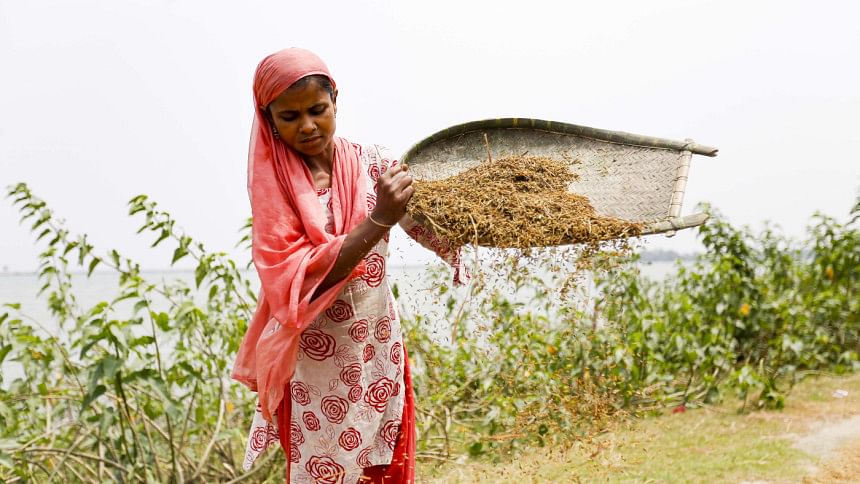Autumn Festivals and Nobanno

I
Ancient societies were agrarian. From farmers at the bottom to zamindars and kings at the top, everybody depended on a good harvest. The word harvest derives from the Old English hærfest which means autumn. The autumn harvest was usually the largest harvest of the year in the Northern Hemisphere. The weather was neither warm nor cold. Everybody prayed to the heavens for manna (sustenance) to fall. When manna did fall, there would be feast and festivity. When manna didn't fall, it could spell disaster for everybody.
Mehregan (Jashan-e Mehr) celebrated the end of the autumn harvest and welcomed winter in ancient Persia. The courts of Persepolis would collect tax and tributes. Haloa was the Greek autumn festival during the month of Poseidon (December/January). In the USA, Thanksgiving celebrated the autumn harvest that traces roots before the arrival of European settlers. Halloween started off as Samhain in the Celtic nations of Ireland, Scotland, and Wales. Samhain celebrated the autumn harvest and welcomed winter.
The autumn festivals were also festivals of thanks to the gods. Farmers paid debts and taxes. Landlords and rulers collected the taxes. The autumn festival in Bengal were all of these and a little bit more.
II
The three great rivers, the Ganges (Padma), the Brahmaputra (Jamuna), and the Meghna form the planet's largest delta. This delta flows through today's Bangladesh making its land one of the most fertile in the world. This delta is the source of a civilisation that came to be known as Bengal. In olden times, Bengal included today's Bangladesh, and West Bengal, Tripura, and the Barak Valley of Assam in India that was a part of the Ahom kingdom. Bengal also included parts of today's Rakhine in Myanmar that was historically a part of the Arakan kingdom.
The largest harvest in Bengal is the Aman harvest. It's harvested in Kartik (late October) during Hemanta (late autumn) when the breeze is neither warm nor cold. The farmers would look towards this harvest to pay taxes to the zamindars and other debts they accumulated through the year. They also looked towards this harvest to see them through the winter. The Boro season as we see it today, didn't exist then.

The autumn festival in Bengal was called Nobanno. Translated, the new rice or the new meal. The harvest transformed into pithas, khoi, muri, mowa, and firni. Green fields became white with kash flowers. Multi-coloured kites flew in the skies. Fairs came to villages with the squeaking noise of nagardolas. There would be puppet shows, dances, snake charmers and games of all sorts. In the evenings, jatras would entertain villagers, while the mystic singers would resonate songs. Somewhere, out of sight, the women would immortalise folktales in nakshi kanthas.
Nobanno went one step ahead of other ancient autumn festivals. The first day of Nobanno is the first day of Agrahayan. This was the first day of the old Bangla calendar. All the months of the Bangla calendar are named after a constellation, except Agrahayan, which means the first month.
There was a sinister side to the harvest. What guarantee was there that a new meal would be a good one? Agrarian economies are fickle. When a harvest wasn't good, it would spell disaster for the farmer. He would enter debts with local money lenders that spelt more disaster. Rulers and kings would have less taxes to fund their armies and expenses. That would bring instability to kingdoms.
In 1944, Bijon Bhattacharya wrote the play, Nobanno. The play depicted the story of the farmer Pradhan Samaddar and his family during the 1943 famine. Small wonder in an agrarian society. Few years later, the sub-continent was partitioned.
III
Today's Bangladesh is more inter-connected and more urbanised than at any point of history. Rural Bangladesh has many safety-nets. It no longer solely relies on the Aman harvest. Pahela Agrahayan lost the battle of the Bangla New Year to Pahela Baishakh centuries ago when Akbar changed the calendar.
Nobanno is no longer the grand festival it was. Tradition, however, doesn't die that easily. Nobanno is still celebrated as the festival of the Aman harvest throughout rural Bangladesh.
Outside rural areas, the melas at the Faculty of Fine Arts, University of Dhaka, and Bangladesh Shilpakala Academy in Dhaka, as well as DC Hill in Chittagong are some of the largest Nobanno melas that are held in the cities.
The band Feedback wrote "Melai Jaire" for Pahela Baishakh. Not too many cultures can boast two new years in one calendar. Pahela Agrahayan is the old Bangla New Year. If "Melai Jaire" is relevant at the Faculty of Fine Arts, University of Dhaka on Pahela Baishakh, it's also relevant on Pahela Agrahayan at the same place. In Bangladesh, you don't need an excuse to party.
Asrar Chowdhury is a professor of economics. He follows Test cricket and listens to music when he has free time. Email: [email protected]; or [email protected]

 For all latest news, follow The Daily Star's Google News channel.
For all latest news, follow The Daily Star's Google News channel. 



Comments